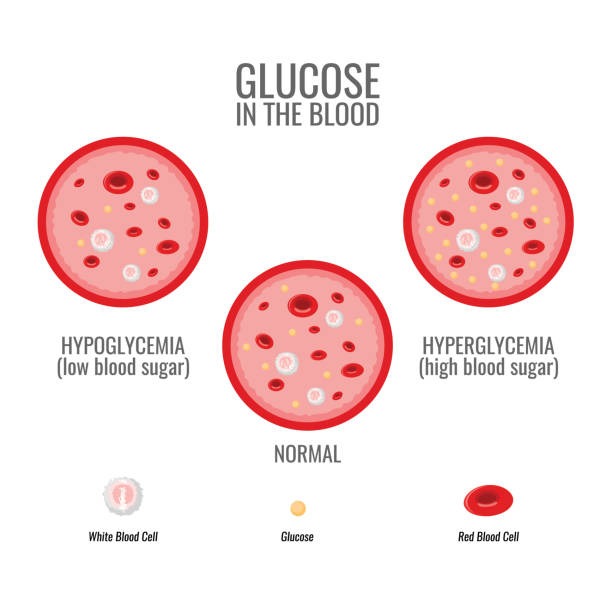“UNDERSTANDING REACTIVE HYPOGLYCEMIA : CAUSES AND EFFECTIVE MANAGEMENT STRATEGIES.
Reactive Hypoglycemia: Causes & Management
Reactive hypoglycemia is a medical condition characterized by low blood sugar (glucose) levels that typically occur a few hours after eating a meal, particularly one that is high in carbohydrates.
Here’s a detailed explanation:
Causes:
Reactive hypoglycemia can be caused by various factors, including:
Over stimulation of insulin:
After a meal, the body releases insulin to help regulate blood sugar levels. In some individuals, an excessive amount of insulin is released in response to a meal, causing blood sugar to drop too low.
Delayed carbohydrate absorption:
Some people may experience a rapid rise in blood sugar followed by a sharp drop due to the body’s inability to properly manage carbohydrate intake.
Hormonal imbalances:
Conditions like adrenal gland disorders or deficiencies in glucagon (a hormone that raises blood sugar) can contribute to reactive hypoglycemia.
Symptoms:
Common symptoms of reactive hypoglycemia include:
Sweating
Trembling or shivering
Rapid heartbeat
Paleness
Fatigue
Irritability
Anxiety
Confusion
Hunger
Harm and Complications:
Reactive hypoglycemia can be uncomfortable and disruptive to daily life, but it is generally not considered a severe condition. However, if left unmanaged, it can lead to several potential complications:
Impaired concentration:
Low blood sugar levels can affect cognitive function and concentration, impacting work or school performance.
Accidents:
Severe hypoglycemia can lead to accidents while driving or operating machinery.
Emotional well-being:
The symptoms can contribute to anxiety and mood swings.
Weight gain:
Some individuals may overeat to prevent blood sugar drops, leading to weight gain.
Diabetes risk:
Ixn some cases, reactive hypoglycemia may be an early sign of an underlying insulin resistance that could eventually lead to type 2 diabetes.
Management:
Managing reactive hypoglycemia typically involves dietary and lifestyle changes:
Food for Hypoglycemia:
Food material to overcome from reactive hypoglycemia :
To help manage reactive hypoglycemia, it’s important to focus on balanced meals and snacks that can help stabilize blood sugar levels. A suitable container for carrying these food items could be a lunchbox or a small insulated cooler bag. Here are some food suggestions:
Complex Carbohydrates:
Include whole grains like brown rice, quinoa, or whole wheat bread. These provide a steady release of glucose.
Lean Proteins:
Incorporate lean protein sources such as , fish, tofu, or legumes. Protein helps slow down the absorption of carbohydrates.
Healthy Fats:
Include sources of healthy fats like avocados, nuts, and seeds. These can help delay the absorption of carbohydrates.
Fiber-Rich Foods:
Foods high in fiber, like vegetables and fruits (especially those with lower glycemic indexes), can help regulate blood sugar.
Snacks:
Carry healthy snacks like nuts, seeds, yogurt, or cheese for between meals to prevent sudden drops in blood sugar.
Avoid Sugary Foods:
Stay away from sugary snacks, candies, and sodas, as these can lead to rapid blood sugar spikes and crashes.
S P E C I A L .
Reactive hypoglycemia is only when we eat large amount of simple carbohydrate ,sugary food ,empty stomach . Firstly glucose spikes in two hours then it crashed below the baseline .
Pl.do not eat any sugary food empty stomach .
FAQ . On Reactive Hypoglycemia:
Q1: What is reactive hypoglycemia?
A1: Reactive hypoglycemia is a condition characterized by low blood sugar (glucose) levels that typically occur a few hours after eating a meal.
Q2: What causes reactive hypoglycemia?
A2: The exact cause is not always clear, but it can be triggered by factors such as excessive insulin release in response to a meal, certain medical conditions (like diabetes or gastric bypass surgery), or diet choices (high sugar or refined carbohydrate intake).
Q3: What are the symptoms of reactive hypoglycemia?
A3: Symptoms can include shakiness, sweating, palpitations, anxiety, irritability, dizziness, and confusion. Severe cases may lead to fainting or seizures.
Q4: How is reactive hypoglycemia diagnosed?
A4: Diagnosis involves blood tests to measure glucose levels during an episode of symptoms and a glucose tolerance test where your blood sugar is monitored after consuming a sugary solution.
Q5: How can I manage reactive hypoglycemia through diet?
A5: Eating balanced meals with complex carbohydrates, fiber, and protein can help stabilize blood sugar levels. Avoiding excessive sugar and refined carbohydrates is crucial.
Q6: Are there medications for treating reactive hypoglycemia?
A6: In some cases, medications like acarbose or diazoxide may be prescribed to help control insulin secretion, but they are typically used when lifestyle changes alone aren’t effective.
Q7: Can lifestyle changes help manage reactive hypoglycemia?
A7: Yes, lifestyle changes like regular exercise, smaller, frequent meals, and managing stress can be effective in preventing episodes.
Q8: Is reactive hypoglycemia a lifelong condition?
A8: It varies from person to person. Some individuals may experience it temporarily due to specific triggers, while others may have a chronic condition that requires ongoing management.
Q9: When should I seek medical advice for reactive hypoglycemia?
A9: If you experience recurrent, severe, or persistent symptoms of hypoglycemia, it’s essential to consult a healthcare professional for a proper evaluation and guidance.
Q10: Can I prevent reactive hypoglycemia?
A10: You can reduce the risk by adopting a balanced diet, regular exercise, and a healthy lifestyle. Monitoring your blood sugar levels and working closely with a healthcare provider can also help manage the condition effectively.
Always consult a healthcare provider for personalized advice and treatment options tailored to your specific situation.
(NUTRITION LIFE CIRCLE)

My Self Hari singh choudhary
S.N.H.S. Dip.(Holistic nutrition), London, S.N.H.S. Dip. (Advanced Nutrition), London, S.N.H.S. Dip. (Holistic Pain Management), London, S.N.H.S. Dip. (Nutrition for Age 50+), London, S.N.H.S. Dip. (Plant-Based Nutrition), London, S.N.H.S. Dip. (Vegetarian & Vegan Nutrition,) London, Certified Diabetes Educator’s (INDO-VIETNAM MEDICAL BOARD, Associate member of The International College of Holistic Medicine, England.
NATURAL DISEASE ERADICATION
[ NUTRITION THERAPY ]
For Business inquiry:-
Email: nutritionlifecircle@gmail.com
WhatsApp Number: +91 9425090558
